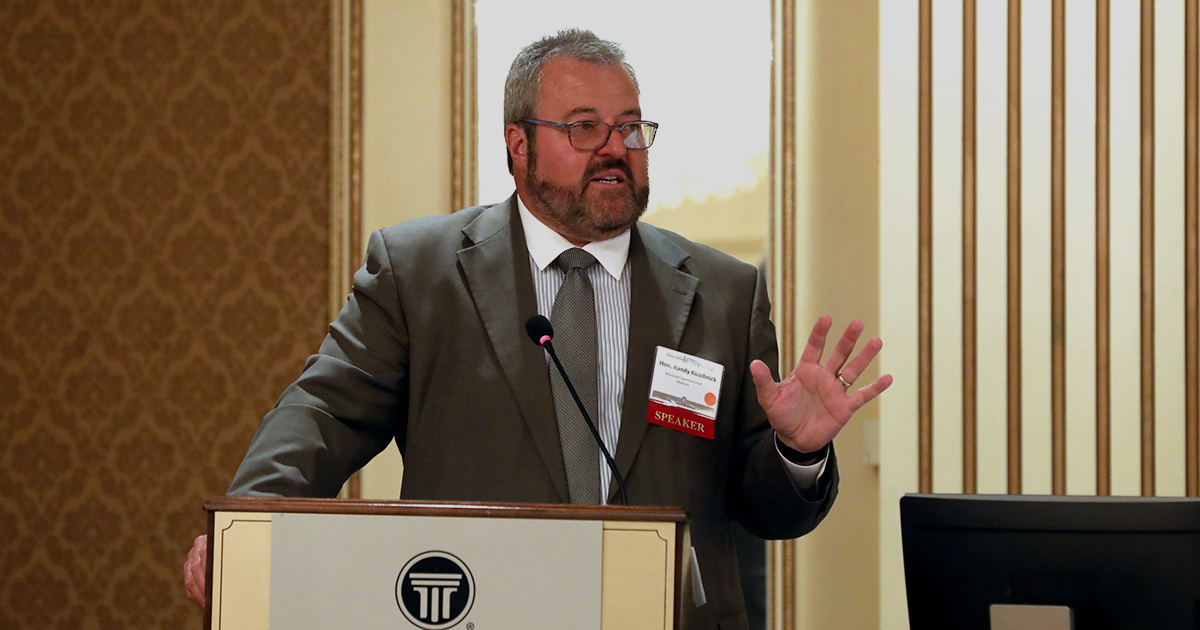
Judge Randy Koschnick, Director of State Courts, gave opening remarks at the June 14 meeting of the State Bar Board of Governors. Koschnick noted recent successes, including a unanimous vote from the Wisconsin Legislature's Joint Finance Committee to increase funding for the criminal justice system. With final approval, the funding will increase pay for prosecutors and public defenders, and increase the hourly rate paid to private bar attorneys who take appointments from the public defender's office. He also said the court system has eliminated the misdemeanor backlog, and is "no longer taking on water" with felony cases. On the flip side, Koschnick said a request for funding for cybersecurity for the court system, as well as judicial security, was denied. He encouraged legal system stakeholders to work together to push increased funding in those areas.
June 15, 2023 – The State Bar of Wisconsin’s Board of Governors voted to approve the creation of a special purpose trust to hold certain reserve assets, among other actions at its June 14 meeting in Milwaukee to open the 2023
Annual Meeting and Conference (AMC). It was the final meeting of the fiscal year.
Under the approved proposal, up to $5 million in reserve assets will be placed into the special purpose trust to ensure the financial security of those assets moving forward.
The board – comprised of elected leaders who represent State Bar members through 16 districts – engaged in a lengthy debate before ultimately approving the trust. The board also voted to approve disclosure of the final trust document to all members, when finalized.
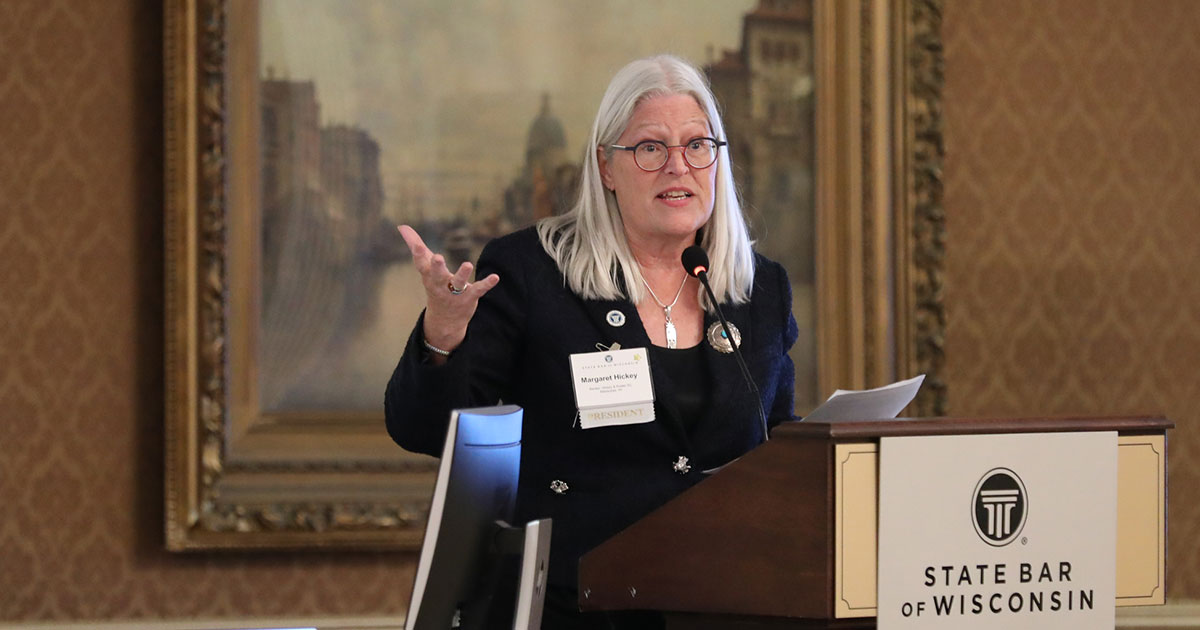
Outgoing State Bar President Margaret Hickey, whose term ends June 30, led the charge on a proposal to create and fund a special purpose trust for some State Bar reserve assets.
The Proposed Trust
The State Bar’s Board of Governors, as elected leaders, has authority and fiduciary responsibility to make informed decisions in carrying out the purposes of the State Bar, as outlined in
Wisconsin Supreme Court Rule (SCR) 10.02(2) (purposes of the State Bar).
That fiduciary responsibility includes how to use the State Bar’s assets to carry out the purposes of the organization.
Under the proposal, some of the State Bar’s reserves, which is less than five months of operating expenses given the State Bar’s annual budget, would be placed into the trust. The recommendation was to place up to $5 million in trust, only a portion of reserves.
Adequate short-term reserve dollars, all day-to-day operating funds, the State Bar building, and all intellectual property, would not be included in the special purpose trust, allowing the State Bar to carry out its business just as it does now.
Although the assets placed within the trust would then be property of the trust to ensure the safeguarding of those assets, an application/grant process would permit the trust to grant funds to the State Bar in support of those stated State Bar purposes.
The purposes of the special purpose trust would mirror the purposes of the State Bar, as outlined in SCR 10.02(2).
Trustees would administer the trust in accordance with those purposes. Trust protectors would ensure that the trust achieves those stated purposes. All initial trustees and trust protectors would be present or former elected officers of the State Bar, as well as the executive director.
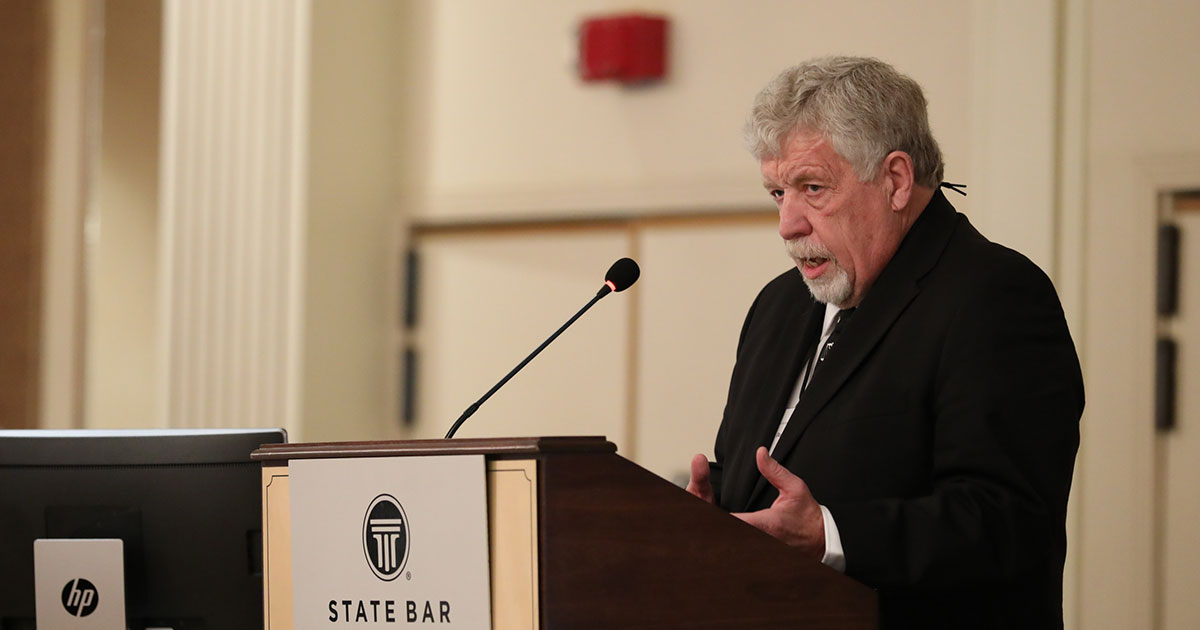
Incoming President Dean Dietrich, whose term starts July 1, encouraged the board to decide the issue of the special purpose trust, rather than delaying action to the next fiscal year.
President Hickey Makes the Case
As it has in prior board meetings, the board moved into closed session to retain the attorney-client privilege on discussions about the special purpose trust document and related memoranda, prepared by attorneys for the State Bar. After those discussions, the board moved to open session to discuss the pros and cons of approving the creation of a trust.
At its last board meeting in April, board members were authorized to discuss the trust with their constituents ahead of the June meeting, and an article about the trust was included in the
May 17 issue of InsideTrack.
Early on, a motion to move the special purpose trust item from an action item to a discussion item, which would have effectively deferred the issue to a future board, was defeated. Seventeen members are going off the board, as of June 30, and the FY 2024 board starts on July 1.
Incoming State Bar President Dean Dietrich discouraged deferring the issue. “Frankly, in thinking down the road, I have a hard time understanding what else I could bring to the board for making a decision. That’s why I would oppose a motion to move this to a discussion item.”
After outgoing State Bar President Margaret Hickey moved to approve and fund the special purpose trust, the board engaged in a lively debate about the merits of doing so.
But Hickey started by providing some history. “This idea came out of a board of governors meeting several years ago, and leadership has worked on the issue on and off over the last several years. It’s not that we had some special committee, some secretive committee.”
“Having said that, there is concern about whether we have a methodology to protect … that money that has been accumulated over probably more than a decade … mostly from, I would say entrepreneurial aspects of the bar, which is CLE and books and things like that, and wise investment decisions,” Hickey said. “This money, quite frankly, is not dues.”
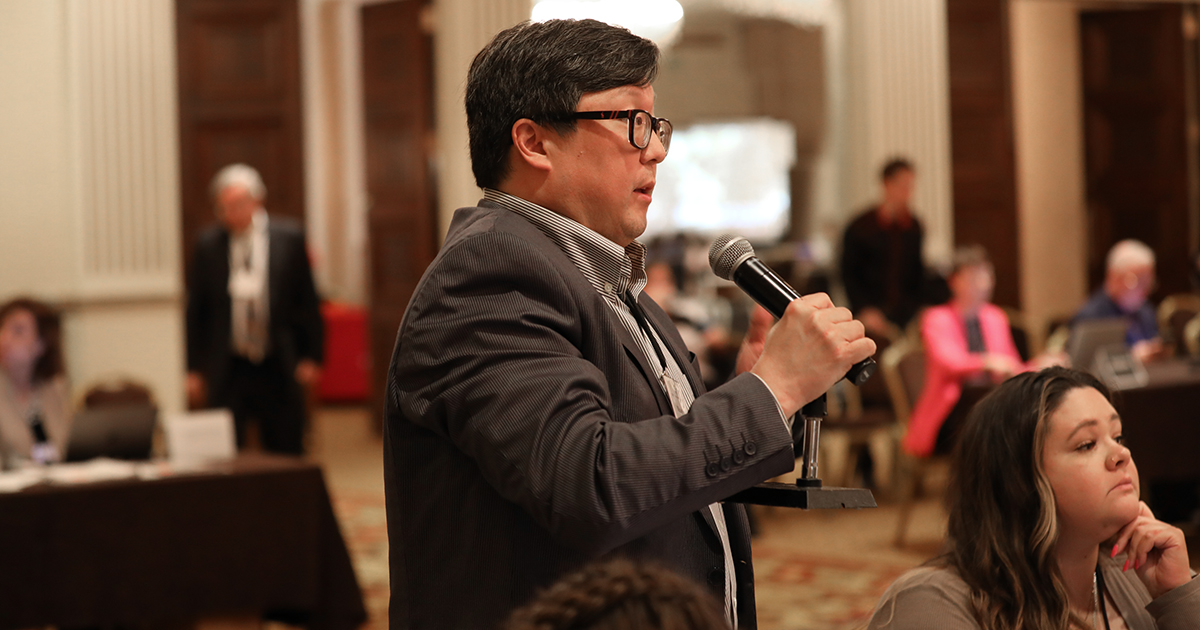
Dist. 9 Gov. Michael Yang supported the creation of a special purpose trust but argued that members should be able to see the trust document before a vote took place. Ultimately, he moved to allow the trust document to be available to the membership, once finalized. That motion passed.
Hickey noted that every single year, the annual budget uses up every dollar of member dues funding. Currently, 55% of the State Bar’s revenue is from non-dues sources. “The money comes from good fiscal management and a few good years in the market,” Hickey said.
The reason to do a special purpose trust, Hickey noted, “is for the financial security of the bar. That’s the reason to do it. It’s not because we are afraid of creditors. It’s not because we are afraid of lawsuits or anything like that. It is for the financial security of the bar.”
Hickey noted that the State Bar has experienced challenges to its mandatory status in the past, and will likely experience them in the future, but nothing is currently pending.
“Lots of you are worried about the uncertainty and the risk. I am too,” Hickey said. “There is uncertainty and there is risk, and with every decision that we make in life, there are pros and there are cons. The issue is, which risk is worth taking, and which risk can we avoid. And here, we believe we can avoid some risks by taking some of this money and putting it into a trust.”
She noted that $5 million would be going to the trust, which is only a portion of the reserve balance. “We are leaving a big portion of money with the State Bar for our operations, for our day-to-day security. We are not putting the bar at risk if we decide to make this decision.”
Hickey said other groups could potentially request funds from the trust, but only if the money is used for the exact purposes of the State Bar, as SCR 10.02(2) states. “Yes, they could get some money. Is that a bad thing, no. Aren’t we all trying to do the same thing here?”
“I think we need to take a stand and lead on this issue,” said Hickey, who noted the proposal went through the process as a reporting item, a discussion item, and an action item.
“If you want to put this off until next year, we are still going to have to follow that process,” Hickey said. “Next year will be taken up by this issue almost as fully as this year has been taken up by this issue. “Four meetings, we’ve spent on this issue. Four meetings. As Dean [Dietrich] said, I don’t know what else we can do to educate the board of governors on this issue.”
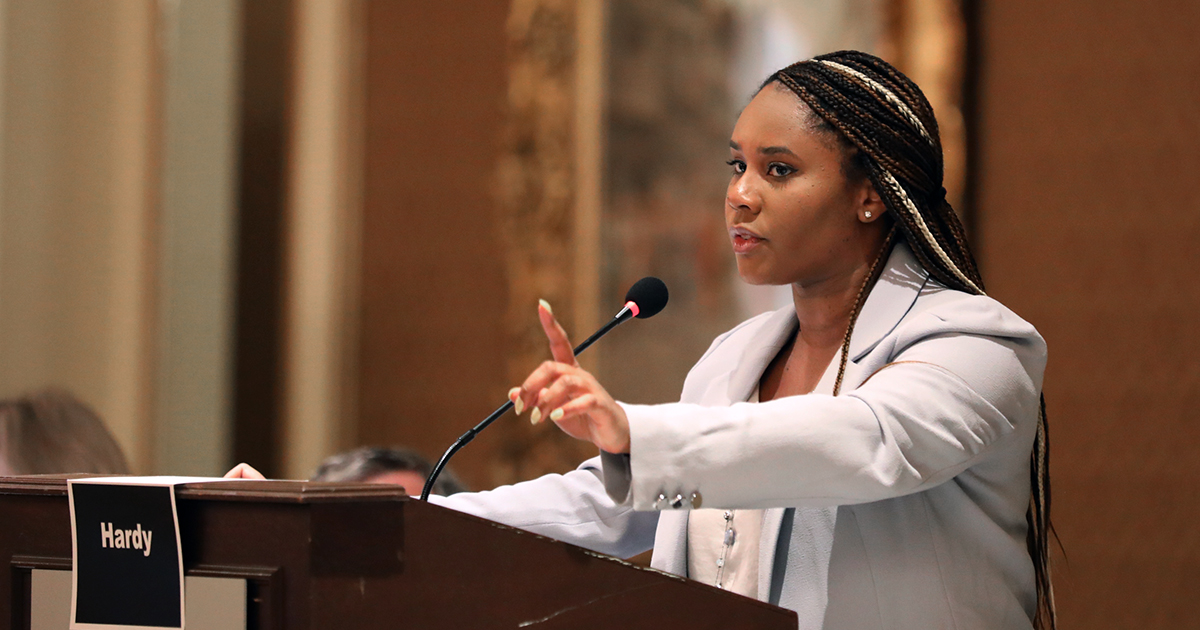
Kristen Hardy, in her final meeting as chair of the Board of Governors, ran a tight ship to move discussion along while ensuring all viewpoints were heard.
Hickey said she and the other presidents, Dietrich and immediate past president Cheryl Daniels, spent a lot of time talking to board members and non-board members about the proposal.
“We’re hearing a lot of negative talk on this issue, but there’s been a lot of positive too. No one stands up and says, ‘hey I talked to a constituent who thought this is a great idea.’ It seems like people just like to talk about the negative.”
But what are the negatives? “Loss of control of the funds, yes,” Hickey said. “That’s how it works. The trust does not work unless you give the money and put up a wall.”
Another negative: members may not like it. “Some members are going to like it, some members are not going to like it,” Hickey said. “Being a leader is not always a popularity contest.”
What about the cost of a challenge against the trust? Hickey noted that the State Bar has spent hundreds of thousands of dollars defending lawsuits brought by its own members.
“If we decide to do this and it costs us some money to defend the decision, I would argue that’s no different than if they sue us on some other issue,” she said. “I urge you to vote in favor.”
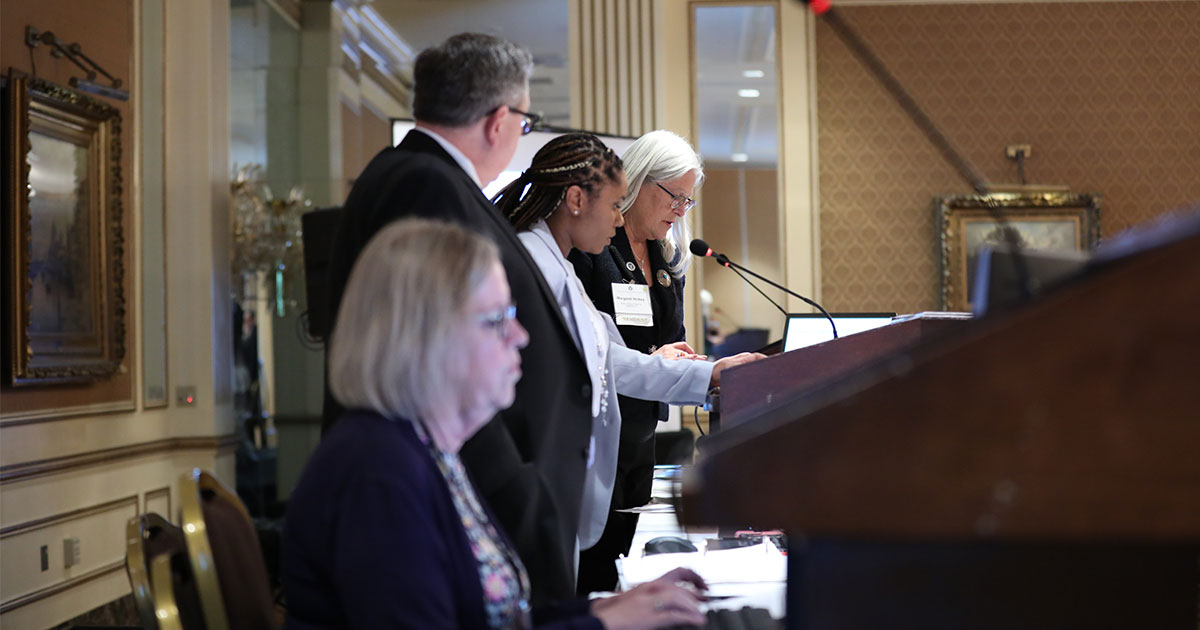
Several votes took place before the final vote on creating a speacial purpose trust. Here, Board Chair Kristen Hardy and President Margaret Hickey tally votes on a motion to call the question, which would have ended debate. That motion failed, and discussion continued.
Lively Debate
Dist. 9 Gov. Michael Yang, who filled a vacant board seat beginning in February 2023, said he supported the proposal, but would not vote for it unless he can show his constituents the trust document first. “Some people just want to see it, why can’t we give it to them,” he asked.
[Note: After the board approved the trust, Yang moved to disclose the trust document to the membership once it is finalized, and that motion passed.]
Dietrich noted that he was on the board, long ago, when it needed to vote on moving from a voluntary bar back to a mandatory bar. “We did not put that to a referendum,” Dietrich said. “Was it painful, damn right it was painful, but we had to make that decision.”
Dietrich, who takes over as State Bar president July 1, reiterated that this is the board’s decision, as elected leaders. “It’s a decision that you have to make, in your mind, as to what is in the best interest of the bar,” he said.
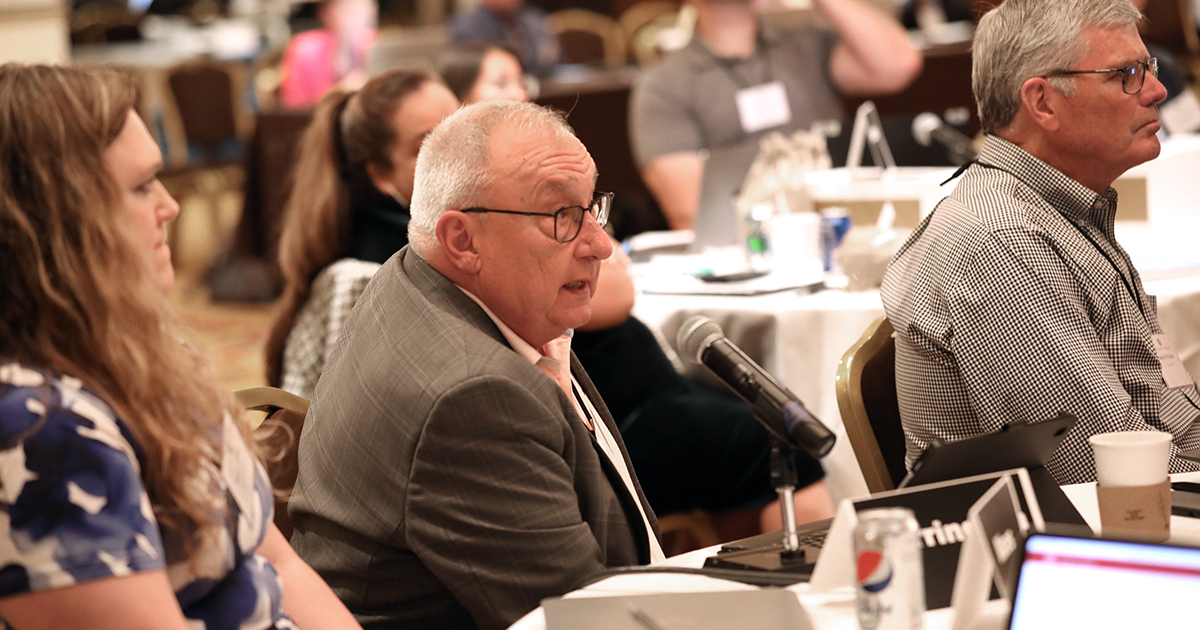
Dist. 13 Gov. Robert Barrington offered thoughts about the proposal to create a special purpose trust.
Dist. 2 Gov. Mary Schanning said when she first heard the proposal, “I thought it was a bonehead idea. But as I heard more information and heard more from our lawyers, I’ve found that I have come to support this idea. I hope and pray that we do not start this process over, that we do actually make a decision today.”
Schanning said as a governor from Milwaukee County, she’s heard a lot of negative conversations from constituents. “But with all due respect to them, they have not heard all the conversation we’ve had here.”
Schanning noted the position description for members of the board of governors, and their obligations. “A large portion of that is to look out for the fiduciary responsibilities of the State Bar,” she said. “We are also to be the eyes and ears of our constituents, but nothing in that description really states that we are to vote exactly as those constituents desire.”
“This conversation has been going on a long time, and while your constituents may feel they don’t have all the information, as board of governors, we have gotten it.”
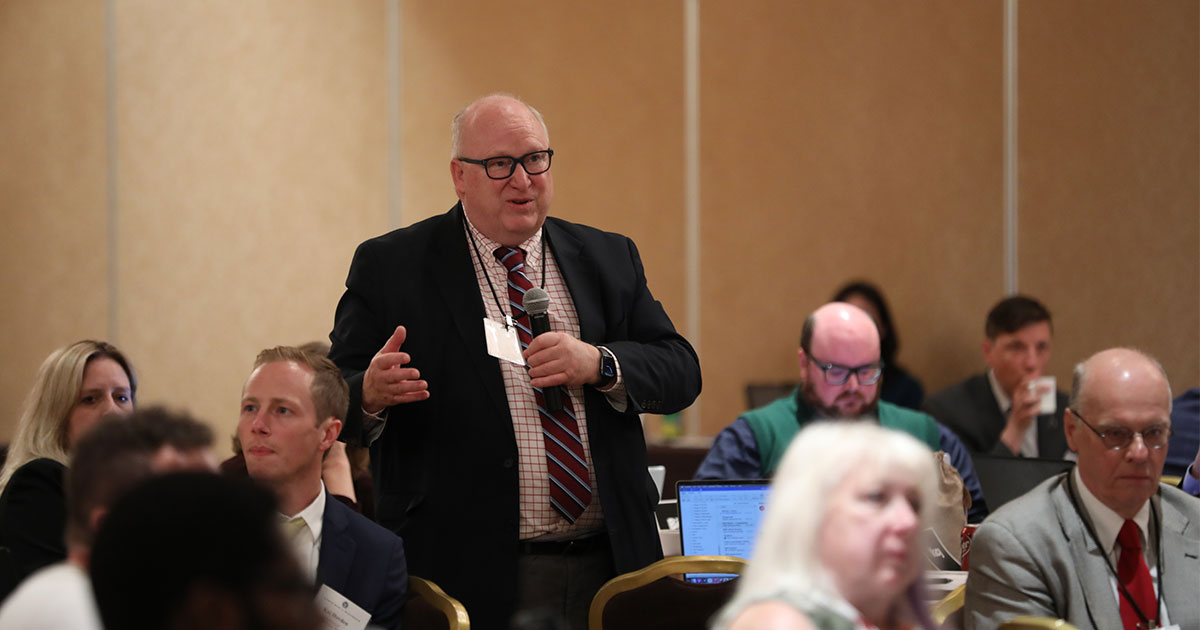
Senior Lawyer Division Representative John Macy opposed the creation of a special purpose trust, arguing that other alternatives would allow the State Bar to keep control of any reserve funds earmarked for the trust.
Nonresident Lawyer Division representative Erik Guenther agreed. “In my opinion, I also don’t know what else could be shared with anybody that hasn’t already, to inform our position as representatives of the bar,” said Guenther, who then called the question.
Calling the question ends debate, but the board must vote to call the question by a two-thirds vote, and that vote failed.
Dist. Gov. Yang moved to table the vote on the special purpose trust to the next board meeting in September as an action item, with a new board. That motion failed by a majority vote.
The debate continued.
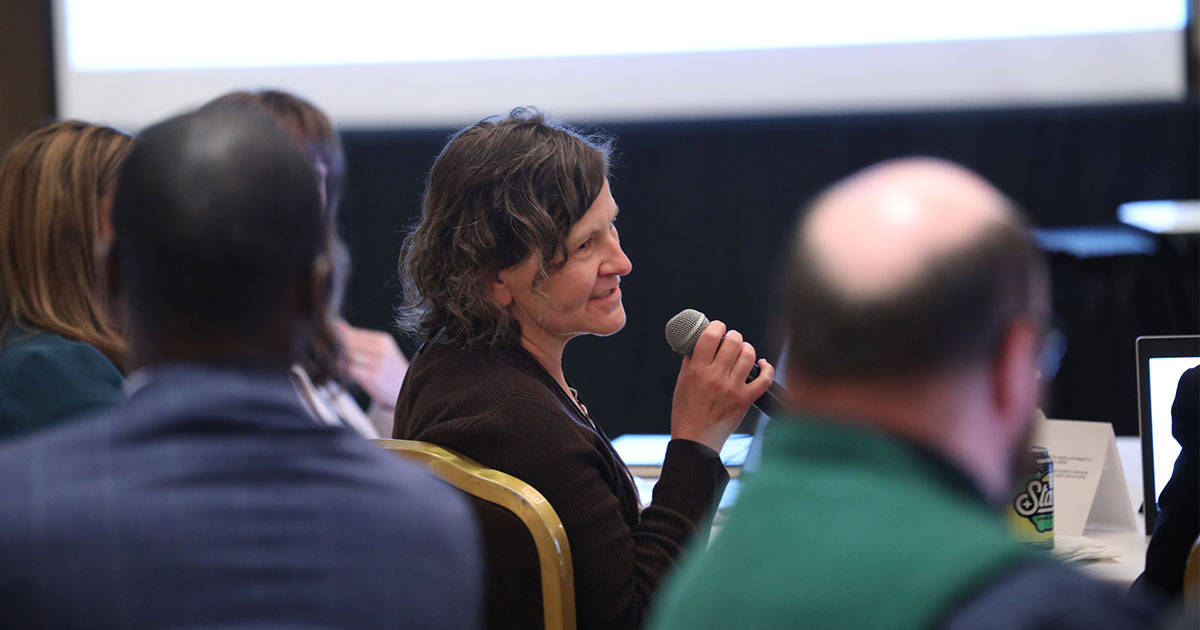
Dist. 2 Gov. Mary Schanning said she was skeptical of a special purpose trust at the outset, but now supports the idea after hearing all the information. She urged the board to make a decision either way.
Dist. 2 Gov. Ryan Billings, who is also the liaison to the Business Law Section, said he sent the
May 17 InsideTrack article to members of the Business Law Section asking for any feedback that could be brought to the Board of Governors attention, and he received none.
But he encouraged all opinions from board members to be heard. “This is a foundational decision for the bar,” Billings said. “I’d like to hear everybody’s opinions. I have not made up my mind yet, which way I’m going to vote, but if debate is cut off, I will vote no.”
Billings also said the proposal has tradeoffs and risks, but that didn’t bother him. “What has bothered me is the idea that we are in a way delegating our oversight of State Bar funds to another party.” he said. “That’s one downside. The other is the court of public opinion.”
Dist. 3 Gov. Renee Read said the board’s fiduciary obligation is to act in the best interest of the State Bar, but those aren’t exclusively financial. “I’m thinking about dissention among the membership. I’m thinking about the overall health of our organization,” she said.
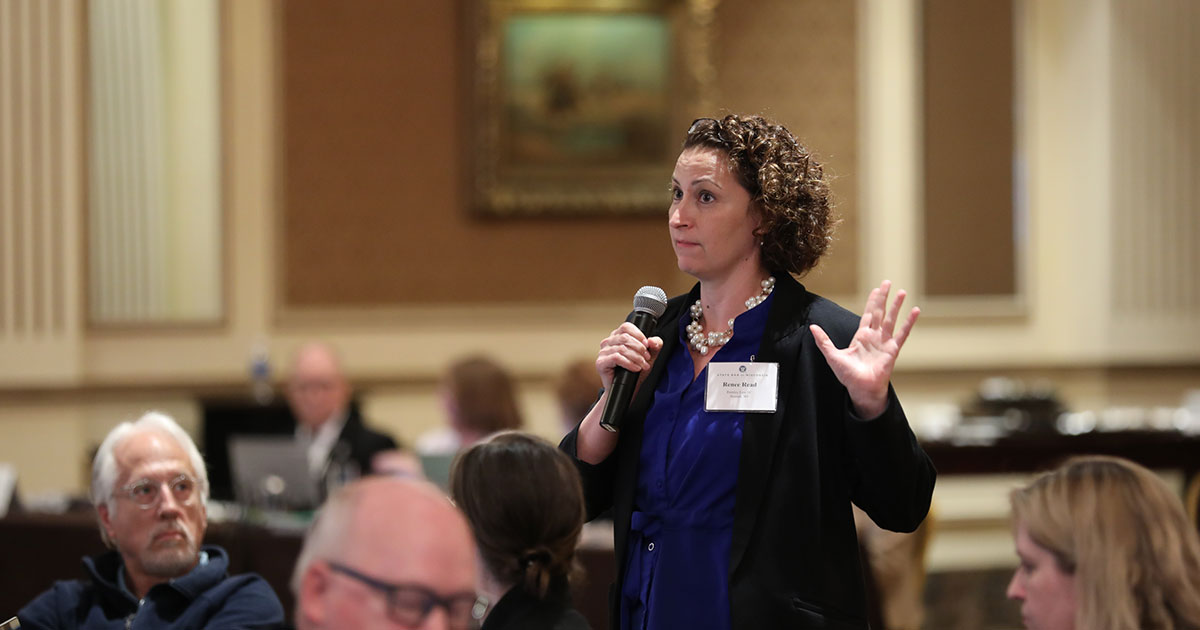
Dist. 3 Gov. Renee Read said a fidicuary duty is not only financial, and was concerned about dissention among the membership concerning the proposal.
Dist. 9 Gov. Mitch said, “a vote to approve and fund the trust is a vote to get sued, is a vote to expend more funds in defending that new and novel suit.”
Senior Lawyer Division representative John Macy said the proposal was not properly presented to the membership. “If you vote yes, that means you believe the 25,000 members of this organization have been properly apprised of this action,” he said.
Macy questioned whether due diligence was done, and he suggested that a special purpose trust is not necessary because there are other tools available. “This is overkill,” he said.
“You could take $5 million and put it in a community foundation and keep control over it,” Macy said. “We are doing this so the money becomes available if we become voluntary.”
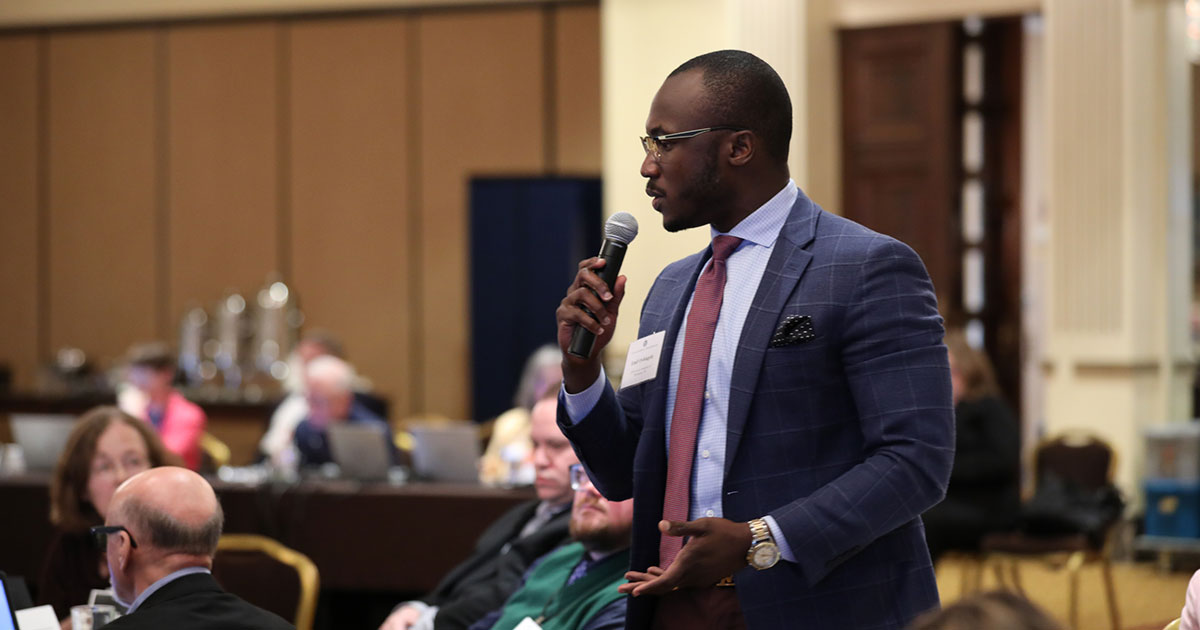
Young Lawyer Representative Emil Ovbiagale urged the board to act, rather than delaying. He said people can disagree about the proposal, but the board - as elected representatives - need to make a decision either way.
Dist. 2 Gov. Lisa Lawless noted that public debate was limited to this meeting. “My other concern is that we are keeping a lot of the basis for our decision in a black box." She also questioned the board’s authority to adopt a trust in the first place.
Young Lawyer Division representative Emil Ovbiagele said this board needs to decide one way or the other. “If you don’t agree with this, that’s fine,” he said. “Take the damn vote.”
Ovbiagele said there’s always a risk that a decision made by a governing body could result in a lawsuit. “If the risk of being sued is too great for you, then vote no. It’s okay to disagree, but at some point we have to make a decision. I will be okay with it, regardless of how it falls.”
Discussion ended. The board then did a roll call vote and the resolution to approve and fund a special purpose trust to up to $5 million of reserve assets passed 23-21.
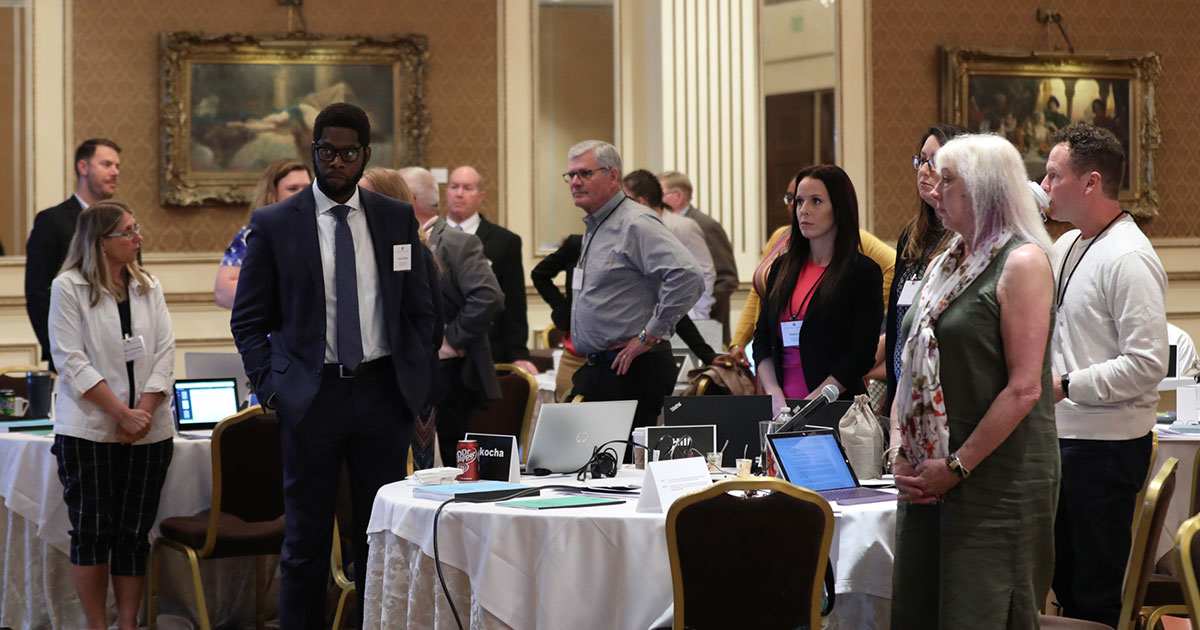
Members of the board stood for a roll call vote. The board approved the creation of a special purpose trust by a 23-21 vote.
Other Business
The board approved the
Strategic Planning Committee’s recommendations for updating the organization’s strategic plan, which outlines the principles, goals and strategies that support the State Bar’s mission and vision. Language amendments better define and direct the work of the State Bar, while making the plan more relevant, current, and strategic, according to the Strategic Planning Committee’s recommendations.
The board approved the Nomination Committee’s recommendation of Dist. 1 Gov.
Joseph Cardamone III as the Chairperson of the Board of Governors for FY 2024. Cardamone is a Kenosha County Corporation Counsel.
The board elected District 2 Gov.
Ryan Billings, NRLD Representative
Kathryn Bullon, NRLD Representative
Erik Guenther, Dist. 6 Gov.
Latrice Knighton, Dist. 14 Gov.
Rachel Maes, and Dist. 6 Gov. AnnMarie Sylla to the State Bar’s 12-member Executive Committee for FY 2023.
The board elected Dist. 3 Gov.
Renee Read as a State Bar of Wisconsin Delegate to the ABA House of Delegates.
Jose Castro, outgoing president of the State Bar’s Young Lawyers Division, was reappointed to serve as the State Bar’s Young Lawyer Delegate to the ABA.
The board approved revisions to the State Bar Administrative Policies and Procedures, updating the organization’s Social Media Policy.
The board approved President Hickey’s appointments to the Wisconsin Trust Account Foundation (WisTAF).
Jamie Schaefer and
DeAngela Luna were reappointed. Dist. 2 Govs.
Rochelle Johnson-Bent and
Basil Buchko are new appointments.
The board approved the appointment of
James Goldschmidt to the Planning and Policy Advisory Committee (PPAC) which advises the Wisconsin Supreme Court and the Director of State Courts
Members may obtain a copy of the minutes of each meeting of the Board of Governors by contacting State Bar Executive Coordinator
Jan Marks
by email or phone at 608-250-6106.
